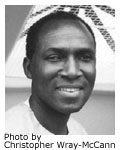|
“I grew up in West Africa, and I had a neighbourhood full of characters. So I wanted to capture those characters to document the story of my people so that thousands of years down the line, they do not tell us we do not have a civilization,” Mohammed Naseehu Ali says, gesturing to emphasize the point properly. That’s one of the things he wants us to take away from his first collection of short stories, The Prophet of Zongo Street. And for those unacquainted with African narratives or the continent in general, “I hope they can see the lives of others as theirs. I hope they will see Africa and African people not as exotic people but as normal people. I hope I opened a window so they can get a picture of how we live.” |
 |
In Toronto, for the International Festival of Authors at Harbourfront, the Ghana-born Brooklyn, NY resident looked tired but at ease and happy to be fully blossoming as a complete artist after the ambivalence of his early years.
“Both my writing and my music started at age nine. When I came to school in the States, my father was thinking about economics or finance, which are the usual things. But my talent as a writer was really coming through.”
His talent as a writer was fully displayed through his story “Mallam Sile,” published in the April 11th, 2005 edition of the New Yorker magazine. “That did more for me than the publication of my book,” Ali says, looking away. That story finally allowed those still doubtful of his skills and others reluctant to accept Ali as the musician and Ali as the writer to put their fears to rest. The story laid the foundation for the collection, which was published in July.
|
The Prophet of Zongo Street [read an excerpt] is an eclectic mix of fables and conventional non-fiction in both African and American settings. Ali touches on a range of subjects in many of the stories. From the debates on cultural hierarchies in “The True Aryan” to the perennial battle between tradition and modernity in African societies in “The Manhood Test” and “The Story of Day and Night.” The title story, for instance, focuses on Kumi, a bookish eccentric man who is full of unwelcome knowledge to bestow on the residents of Zongo Street. “The Christian and Islamic intrusionists came and asked our ancestors to look up in the sky while they filled their ships with our gold, young men and women, timber, diamonds and cocoa,” Kumi quips in one of his many sermons, a typical Mohammed Naseehu Ali character, full of philosophy and both articulate and eager enough to spread it. The names of the writers who inspired him leap from the pages: Ayi Kwei Armah (who wrote The Beautiful Ones Are Not Yet Born), Ben Okri, Cyprian Ekwensi, Amos Tutuola (author of The Palm Wine Drunkard), and, of course, the great Chinua Achebe. |
But throughout the narrative, the one name that stands out, almost demanding to be acknowledged, is that of Trinidad-born V.S. Naipaul.
{sidebar id=10}
“I stole from Naipaul,” Ali laughs. For years, I was angry every time they announced the Nobel Prize [in literature]. I kept thinking, ' Listen, guys, you’re gonna have to give this guy the prize.’ He’s gigantic! He is a huge part of why I tell stories.”
Lately, he has also taken an interest in photography as a way of furthering what he views as one of the most important causes requiring the energies of Africans both at home and in the Diaspora.
“One of my main goals in writing is to document the history of the people, the Hausa, who migrated to Ghana at the turn of the century. I want their story to be there. I want their civilization to be part of whatever someone is going to dig up somewhere thousands of years from now. I think we have to do more of that. We have to document life through painting, writing, and photography.”
Ali also believes Africans must stop feeling ambivalent and ashamed about writing African stories in languages like English and French, which are still viewed as foreign to the continent.
They need to be claimed, he says, “because they’re ours too [laughs]. I mean, Soyinka [Nigerian author, essayist, playwright and Nobel Prize winner Wole Soyinka], for instance, knows English to a scary point, and he uses that to open the complete Yoruba culture to us.”
Mohammed Naseehu Ali is equally candid about focusing on specific themes as a writer of African origin.
“I know Chinua Achebe is big on the notion of the African writer as a teacher, but I think we have to be able to branch out because a lot of Africans are being born in the Diaspora now whose experience is no different from any other Canadian or American.”
Look for more interesting and enlightening work from Mohammed Naseehu Ali in the upcoming months.
“I have two novels in the works; one of them will explore polygamy in West Africa,” he says, sounding contemplative. “My father married many wives so … [pause]. Part of what I do when I write is to try to understand things that are lurking in my head. So, with this book on polygamy, I am trying to understand why men do it and how women suffer in it.”
The Prophet of Zongo Street is in bookstores now and available online at www.amazon.ca


